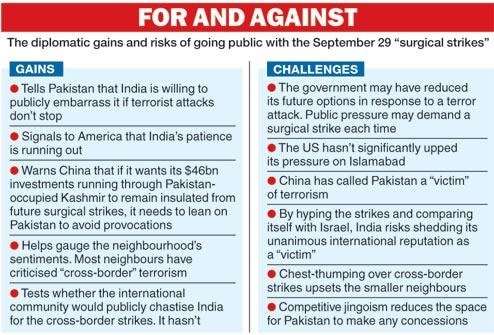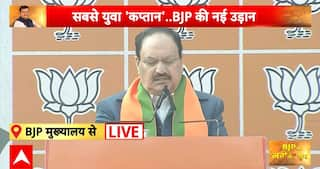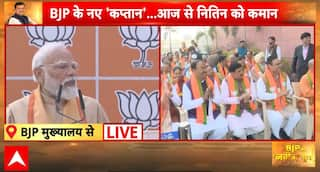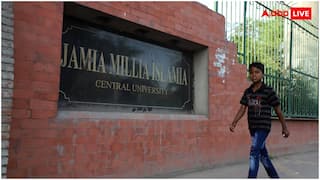Rewards and risks of surgical strikes

New Delhi: When television tickers flashed an explosion in Delhi's Chandni Chowk last week, nerves grew taut in South Block where India's diplomatic and defence establishments have for weeks prepared for the possibility of a terror attack.
Those preparations are rooted in the expectation of a response from Pakistan to India's decision to publicise its September 29 "surgical strikes" across the Line of Control, after years of unpublicised raids.
As it became clear that firecrackers - and not a bomb - had set off the Chandni Chowk blast, two diplomats who had turned their attention to the television sets in their offices returned to their work.
But their initial responses - shared by them with this newspaper - reveal a churning within the foreign office over the gains and risks involved in the decision to go public with the operations.
India has shown through this move its growing unwillingness to absorb terrorist strikes, several serving and retired diplomats, including three former foreign secretaries, and analysts have told The Telegraph.

Countries like the US and China with an interest in avoiding a military escalation between the South Asian neighbours now know they need to lean on Pakistan to stop provocations, they said.
The criticism of "cross-border" terrorism by most of India's neighbours after the Uri terror attacks on September 18 suggests broad regional support for New Delhi.
But by going public, the government may also have restricted its diplomatic options after any future terror attack, some analysts have cautioned. The unceasing tom-tomming of the strikes and the consequent hysteria have reduced the space for any meaningful diplomatic opening with Pakistan.
The chest-thumping may discomfit some of India's smaller neighbours, where Indian forces have conducted covert operations. And both the US and China have indicated that they still view Pakistan as a frontline state in the fight against terrorism.
"It was important to carry out these strikes to draw a line," said Savita Pande, professor of South Asian studies at Jawaharlal Nehru University. "But after that, it should have been quiet. By going on and on about it, you build hysteria that makes meaningful diplomacy very difficult - and shrinks your future options."
Past strikes across the LoC were aimed principally at sending Pakistan and its military a message without escalating tensions - and keeping the operations unpublicised served these goals.
That approach changed when the director-general of military operations announced on September 29 that the Indian Army had conducted "surgical strikes" against "launch pads". Although, officially, the strikes were pre-emptive, they were widely viewed as India's response to the Uri attack.
The decision to publicise the strikes hours after they had been completed had clear diplomatic motives too, diplomats said.
The US, which is keen to avoid a military conflict between the nuclear-armed neighbours that would invariably need its diplomatic intervention, now knows that India's restraint has limits.
"You're cautioning the US that they need to lean on Pakistan to avoid future provocations," said Lalit Mansingh, foreign secretary from December 1999 to March 2001, who later also served as ambassador in Washington.
Like the US, China too has stakes in avoiding future surgical strikes by India inside Pakistan-occupied Kashmir, through which Beijing is building a $46-billion trade-and-transit corridor connecting its distant northwest to the Arabian Sea.
"You're indirectly warning China that if you don't want your investments to be adversely impacted, you've got to make sure Pakistan stops provocations in the form of terror strikes," said Kanwal Sibal, foreign secretary from July 2002 to November 2003.
From the neighbourhood's perspective, going public with the strikes turned out to be well-timed, contended Shashank, who succeeded Sibal as foreign secretary and held the post till July 2004.
"That most of our neighbours joined us in criticising cross-border terrorism after the Uri attack, and even after the surgical strikes, suggests that the foreign office had the pulse of the neighbourhood," Shashank, who goes by a single name, said.
It was worth trying this strategy, Sibal said, since "the past approach didn't really bring us the results we wanted" - adequate pressure on Pakistan to stop terrorist activities against India.
But declaring operations that are traditionally cloaked in deniability amounts to walking a fine line diplomatically, and political chest-thumping can significantly complicate that task, analysts said. There is little evidence yet that all the intended recipients of India's messages have interpreted them exactly the way New Delhi wanted them to.
"This also puts pressure on the government that the next time you have a significant terrorist attack, it will need to react similarly, with a cross-LoC strike," Sibal said.
The sense that the government will in the future too need to respond the way it did to the Uri attack may in itself not be bad for the country, Sibal said. If it sends the message to the international community that it needs to ensure that Pakistan prevents future terror attacks to pre-empt a crisis, the strategy could work, he said.
But China last week declared that it viewed Pakistan as a "victim" of terrorism, and that Islamabad's "sacrifices" must be recognised. And while leaning on Pakistan to tackle all forms of terrorism, the US is also urging India to defuse tensions.
"That kind of opinion - that India too needs to do more - is still there in the US," Sibal said.
Chest-thumping over cross-border operations upsets smaller neighbours, in many of whose territories - Bangladesh, Myanmar and Bhutan - Indian forces have carried out "hot pursuit" initiatives, chasing and targeting militants who have attacked India.
"Hot pursuit efforts need the cooperation of the other country, and you must not jeopardise that," Shashank said.
Myanmarese foreign minister Aung San Suu Kyi this week ensured that a joint statement issued with Prime Minister Narendra Modi after talks here included an assurance of "respect for sovereignty and territorial integrity".
Indian forces had conducted a raid on militants in Myanmar last June, after an army convoy in Manipur was attacked. But Modi government ministers declared the "cross-border" nature of those operations publicly, continuing to do so even hours before Suu Kyi's talks with Modi.
"The government is responsible (for this)," Mansingh said. "This was unfortunate."
With Pakistan, too, the use of the surgical strikes to intensify the shrillness of bilateral discourse is risky, said Pande, the JNU professor.
The idea, she said, should be to pressure Pakistan into dismantling its terrorist infrastructure but not to create conditions where it becomes difficult for the civilian or military leadership there to make any concessions.
"Competitive jingoism creates that problem," Pande said. "You don't want to vitiate the atmosphere to a point where you effectively close the window for negotiations."
Related Video
Breaking News: BJP’s New National President Pays Tribute to Party Workers and Leadership







































